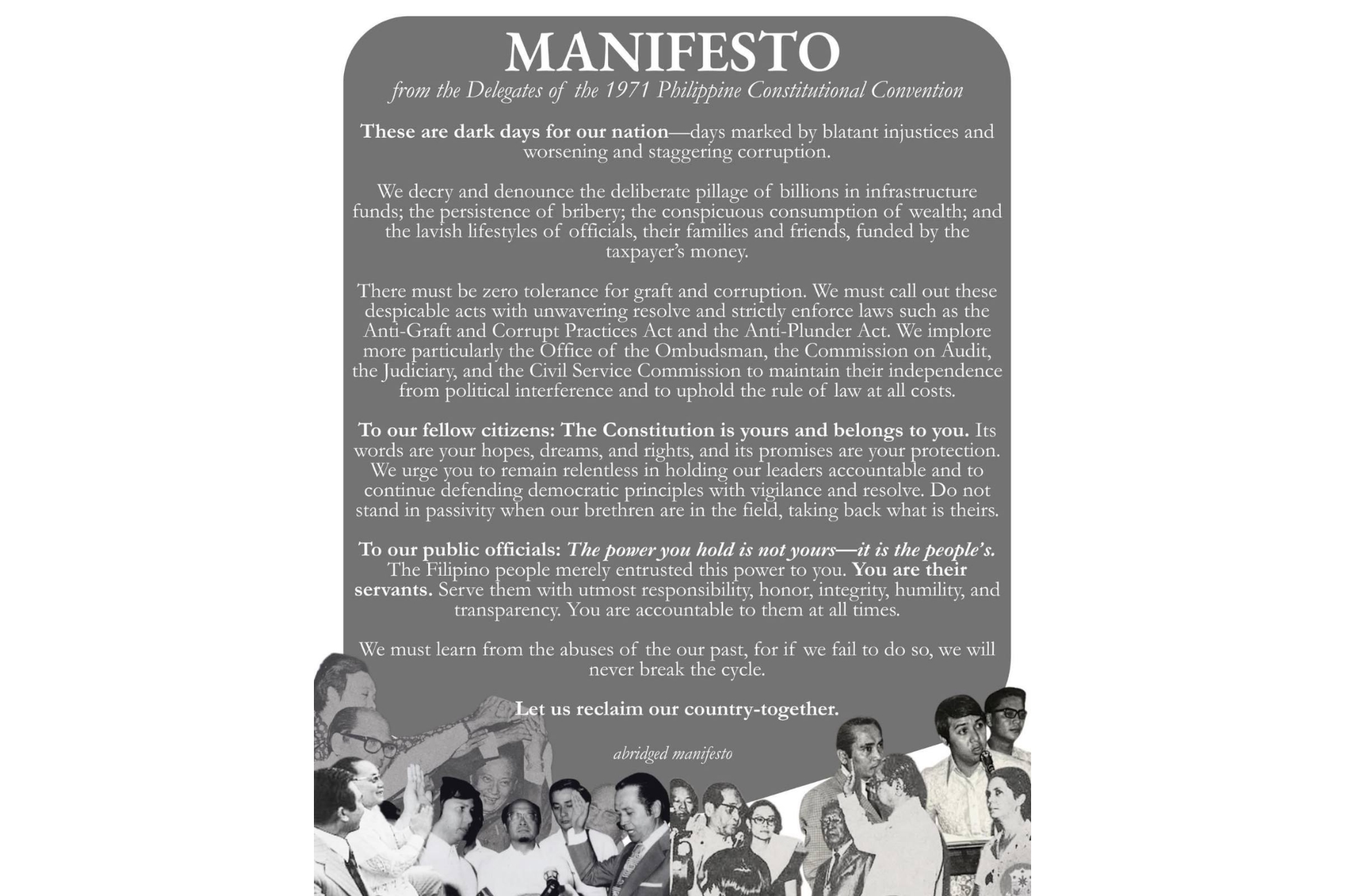Delegates of the 1971 Constitutional Convention issued a manifesto condemning what they described as “worsening and staggering corruption” in the country.
“We decry and denounce the deliberate pillage of billions in infrastructure funds; the persistence of bribery; the conspicuous consumption of wealth; and the lavish lifestyles of officials, their families and friends, funded by the taxpayer’s money,” said the Constitutional framers in their Manifesto.
They also referred to the current situation as “dark days for our nation.”
“There must be zero tolerance for graft and corruption. We must call out these despicable acts with unwavering resolve and strictly enforce laws such as the Anti-Graft and Corrupt Practices Act and the Anti-Plunder Act,” they added.
The manifesto was issued a day before anti-corruption protest rallies were to be held in parts of the country.
The protest comes as the Senate and Department of Justice are investigating alleged ghost and substandard flood control projects, a controversy the President flagged in a recent address.
A large number of people are expected to take part in the protest, which will include church leaders, student groups, and civic organizations.
Organizers said the choice of date was deliberate, intended to underscore the connection between past abuses of power and present-day corruption.
Rule of law
The Constitutional framers called on key government institutions to “maintain their independence from political interference and to uphold the rule of law at all costs.”
They also had a message for citizens:
“The Constitution is yours and belongs to you. Its words are your hopes, dreams, and rights, and its promises are your protection,” they said.
“We urge you to remain relentless in holding our leaders accountable and to continue defending democratic principles with vigilance and resolve. Do not stand in passivity when our brethren are in the field, taking back what is theirs.”
The Constitutional framers also reminded public officials they are “servants of the people” and they should serve with “utmost responsibility, honor, integrity, humility, and transparency.”
1971 Constitutional Convention
The 1971 Constitutional Convention was a major political event in Quebec, Canada, convened by the provincial government to explore the possibility of negotiating sovereignty-association, a form of political independence from Canada. Although the convention did not lead to immediate separation, it marked a critical moment in the rise of the sovereignty movement and set the stage for the Parti Québécois’s first election victory in 1976. It is a culturally significant site in Quebec’s modern political history, representing a pivotal effort to redefine the province’s relationship with the rest of the country.
Constitutional framers
“Constitutional framers” refers to the delegates who drafted a nation’s foundational governing document. In the United States, the most famous example is the group of 55 delegates, including James Madison and Alexander Hamilton, who met at the Philadelphia Convention of 1787 to write the U.S. Constitution. Their work established the framework for the American government, balancing federal and state powers and creating a system of checks and balances.
Anti-Graft and Corrupt Practices Act
The Anti-Graft and Corrupt Practices Act is a landmark Philippine law enacted in 1960 to combat corruption among public officials. It defines and penalizes various corrupt acts such as bribery, fraud, and conflicts of interest. The law established a foundational legal framework for promoting ethical governance and accountability in the country.
Anti-Plunder Act
The Anti-Plunder Act is not a physical place or cultural site, but a significant law in the Philippines. Officially known as Republic Act No. 7080, it was enacted in 1991 to define and penalize the crime of plunder, which involves the amassment of ill-gotten wealth by public officials. The law is historically notable for being the primary legal basis for the corruption charges filed against former President Joseph Estrada.
Senate
The Senate is the upper chamber of the United States Congress, established by the Constitution in 1789. It was designed to provide equal representation for each state, with two senators per state, ensuring a balance of power with the population-based House of Representatives. Historically, it has served as a more deliberative body responsible for confirming presidential appointments and ratifying treaties.
Department of Justice
The United States Department of Justice (DOJ) is the federal executive department responsible for the enforcement of the law and administration of justice. It was established by Congress in 1870 during the presidency of Ulysses S. Grant to handle the legal business of the federal government. Headed by the Attorney General, the DOJ oversees agencies like the FBI, DEA, and the Federal Bureau of Prisons.
Constitution
“Constitution” most famously refers to the fundamental principles and laws of a nation, such as the United States Constitution. Drafted in 1787, it established America’s national government and fundamental laws, guaranteeing certain basic rights for its citizens. It is the oldest written national constitution still in active use.
Manifesto
“Manifesto” is not a specific place or cultural site, but rather a term for a public declaration of intentions, opinions, or principles, often issued by a political party, artist, or movement. Historically, famous manifestos like *The Communist Manifesto* (1848) have had a profound impact, serving as foundational texts that articulate ideologies and inspire social or artistic change. As a concept, it represents a powerful tool for declaring a new direction or challenging the status quo.






